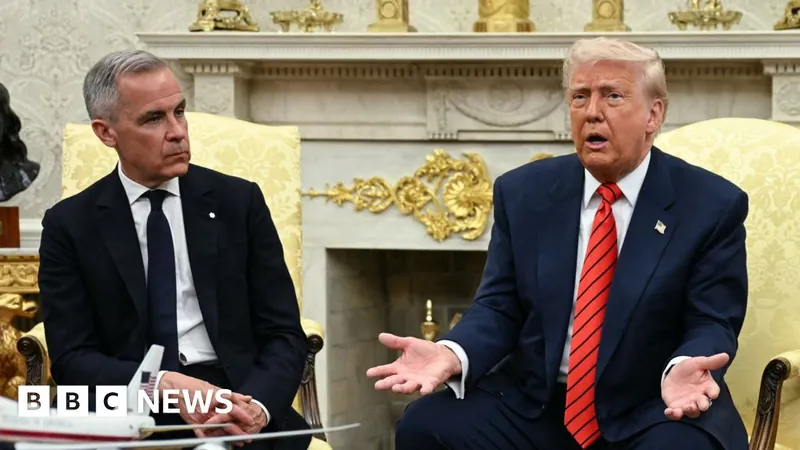
How Trump's Second Term Could Transform American Business: Musk, Tariffs, and Economic Policies Unleashed!
2024-11-06
Author: Emma
Donald Trump's Return to the White House
Donald Trump's return to the White House after winning the Nov. 5 U.S. presidential election is set to shift the landscape of American business dramatically. Key appointments, including whether Tesla CEO Elon Musk will play a significant role, and potential tariff changes, will be pivotal in shaping economic policies.
Elon Musk's Potential Influence
Trump has floated the idea of appointing Musk to head a new government efficiency commission aimed at slashing at least $2 trillion from the current federal budget of $6.75 trillion. Musk, who has been vocal about reducing federal oversight, particularly concerning his ventures like SpaceX, could drive a reduction in regulations affecting various industries, including self-driving cars and renewable energy. However, the dynamics between Trump and Musk won't be straightforward, especially considering their differing views on California's aggressive EV policies.
Musk's advocacy for cryptocurrency aligns with Trump's promise to embrace the sector, especially if it means replacing SEC chair Gary Gensler, known for his tough stance on crypto regulations. The collaboration between Trump and Musk could pave the way for a more favorable environment for digital currencies amid a landscape where traditional banking institutions and tech investors rally for change.
A Tariff Tornado
Trump's proposed tariffs are nothing short of eye-catching: a blanket 10% on all U.S. imports and a staggering 60% on goods from China. This could lead to significant increases in consumer prices and a projected $524 billion tax hike annually, which would ripple through the economy. The National Retail Federation warns that these tariffs could reduce consumer spending power by up to $78 billion each year, severely impacting everyday goods like apparel and electronics.
Retail giants could respond by relocating their supply chains to countries like Bangladesh and Vietnam to avoid high tariffs. Simultaneously, Trump's criticism of the CHIPS and Science Act could destabilize the tech industry, as increased tariffs on semiconductor imports from Taiwan may thwart domestic production efforts.
A looming concern is how these tariffs could invoke retaliatory measures from China, which historically has leveraged such economic tensions against U.S. agricultural exports.
Oil and Gas Policies: Drill Baby Drill!
Under Trump, energy production priorities would shift towards easing obstacles for oil and gas companies. He has proposed lifting restrictions on LNG export permits while also fast-tracking pipeline projects. However, the approach to dealing with rival exporters such as Russia and Iran will be crucial. While he may lift sanctions on Russian energy, sanctions on Iran are likely to remain in place, potentially leading to decreased exports from the Islamic Republic and affecting global oil prices.
Labor Dynamics and Union Relations
Organized labor, having gained ground during Biden’s tenure, faces challenges under Trump, who has historically been perceived as less union-friendly. Despite this, his efforts to appeal to blue-collar workers could mean a complicated relationship with labor unions. Past appointments to the National Labor Relations Board signal a lean towards curbing workers' rights rather than prioritizing union advancements post-pandemic.
Finance, Technology, and Media Shake-ups Ahead
Banking institutions may experience relief from recent stringent regulations and policies targeting “junk fees,” as Trump’s administration could usher in industry-friendly changes. However, economic policies focusing on tariffs and taxes could inadvertently widen budget deficits and fuel inflation, complicating the banking landscape.
In the tech sphere, Trump’s administration may reverse aggressive antitrust actions against giants like Google, creating a more favorable environment for tech mergers and reducing regulatory scrutiny—much to the delight of his Silicon Valley backers.
Lastly, Trump’s contentious stance towards media could resurface, especially as he seeks to exert influence over broadcasting regulations, raising concerns over press freedom. Expect cable networks and major newspapers to ride another wave of heightened viewership fueled by Trump's presidency.
Pharmaceutical Policies: A Wild Card!
Trump's controversial association with Robert F. Kennedy Jr., a notable anti-vaccine advocate, could lead to dramatic changes in healthcare policy. If Kennedy were to gain influence over agencies like the FDA, the implications for vaccine approval processes could raise alarms in the public health sector.









 Brasil (PT)
Brasil (PT)
 Canada (EN)
Canada (EN)
 Chile (ES)
Chile (ES)
 Česko (CS)
Česko (CS)
 대한민국 (KO)
대한민국 (KO)
 España (ES)
España (ES)
 France (FR)
France (FR)
 Hong Kong (EN)
Hong Kong (EN)
 Italia (IT)
Italia (IT)
 日本 (JA)
日本 (JA)
 Magyarország (HU)
Magyarország (HU)
 Norge (NO)
Norge (NO)
 Polska (PL)
Polska (PL)
 Schweiz (DE)
Schweiz (DE)
 Singapore (EN)
Singapore (EN)
 Sverige (SV)
Sverige (SV)
 Suomi (FI)
Suomi (FI)
 Türkiye (TR)
Türkiye (TR)
 الإمارات العربية المتحدة (AR)
الإمارات العربية المتحدة (AR)